 |
 |
 |
 |
 |
 |
 |
 |
 |
First Division - Elland Road - 25,088
Scorers: Lorimer 3, 1 pen (23 mins, 27, 65), Bremner (78), Jordan 2 (80, 81)
Leeds United: Harvey, Reaney, Cherry, Bremner, Yorath, Hunter, Lorimer, Clarke (Jones 40), Jordan, Giles, Madeley
Arsenal: Wilson, Batson, McNab, Storey, Blockley, Simpson, Armstrong, Ball, Radford, Kennedy, Hornsby (Price 45)
Four days after their debacle at Wembley Stadium, United
had the chance to recover at least some of their lost pride, as they hosted
First Division runners-up Arsenal in their final league game of the campaign. United still retained strong hopes of some silverware in
the form of the European Cup Winners' Cup. Leeds had reached the final
against AC Milan, but it was important to Don
Revie and his men to end their Division One season on a high by beating
the Gunners. It wouldn't make any difference to final placings in the
table, as Arsenal were certain of second place behind Liverpool with United
guaranteed third spot ahead of Bobby Robson's Ipswich, but Leeds were
hungry for victory. The only changes to United's Wembley line-up saw
Terry Yorath in for Eddie Gray and Joe Jordan replacing Mick Jones,
named sub. For the Gunners, Pat Rice and Charlie George were both
unavailable through suspension; 18-year-old Brian Hornsby came
in for his debut with 20-year-old Brendan Batson at right-back.
17-year-old David Price was on the bench. Otherwise, Arsenal were
at strength. Both sides had suffered a disappointing loss of
form in the season's closing weeks: United hadn't won any of their
five games since they beat Crystal Palace 4-0 on 21 April, registering
just two goals in that time. For their part, the Gunners had won
just once since their own defeat of Palace on 26 March. During
that time, they had also gone out of the FA Cup to Sunderland,
losing 2-1 in the Hillsborough semi-final. Games between the two sides had long been characterised
by tenacious football and fiery tempers; the League
Cup final contested by the clubs in 1968 had been a dour and bitter
battle, one of the poorest in Wembley's history. The league clash in December
at Highbury had seen six men booked, five of them from Leeds, though some
of the blame for that was undoubtedly down to the somewhat officious refereeing
of Clive Thomas. A number of United's cautions had been awarded for
dissent. Following the game at Highbury, Don Revie decided enough
was enough. He decreed that captain Billy Bremner should sport
an armband indicating his status and gave instructions to the
other players that only Bremner should approach referees. He indicated
that anyone breaking the rule would face disciplinary Revie: 'The number of Leeds United players booked for dissent
has become critical. For example, five of our players had their names
taken at Arsenal recently - three for disputing the referee's decisions.
The offence carries a four point penalty under the new disciplinary code
and our inability to avoid it has resulted in Billy Bremner, Trevor Cherry
and Allan Clarke facing two-match bans. 'I have mixed feelings about this business of punishing
players for appealing against decisions which they believe are wrong.
For one thing, dissent is a relatively minor offence and I feel it is
wrong that the penalty is the same as that meted out to a player who commits
a deliberate foul. 'In addition, I believe all referees should be prepared
to listen to a protest by a team's skipper, providing it is made in a
constructive manner. In fact, we are going to write to the FA, the League
and the Referees' Association suggesting a rule to this effect. 'I admit that some of our players have allowed themselves
to be carried away and I have now invoked a rule whereby only Bremner
is allowed to approach the referee. Anyone who disobeys will be disciplined
by the club. 'In turn, referees should adopt a more lenient attitude
and not be so sensitive. It is easy for outsiders to say players should
accept the referee's decisions. These people clearly don't appreciate
the pressures of the game.' Revie's move cut no ice with the powers that be,
with Vernon Stokes of the FA telling him sharply that the captain
had no more right than any other player to dispute a decision. The early stages of the game at Elland Road offered
clear signals that this latest fixture would maintain the trend
of bitter clashes between the two clubs. During the opening minutes,
Arsenal's £200,000 centre-half Jeff Blockley and midfield destroyer
Peter Storey were typically forthright in their tackling as they
sought to unsettle Leeds. They could justifiably claim, however,
that United started it all with Norman Hunter flattening Storey
in the opening minutes. Blockley was the first man in the notebook of referee
Bob Matthewson after 20 minutes when he attempted to bring Jordan
down with a Rugby tackle as the Gunners sought to resist United's
opening burst. The home Three minutes later Leeds opened the scoring. Jordan
had already shown impressive form, giving both Blockley and Batson
a bit of a chasing in the early minutes and when the Scottish
striker sought to make an opportunity for himself in the area,
Batson wrestled him to the ground and the referee had little hesitation
in awarding the penalty. Arsenal's players were far less convinced and protested
furiously, insisting that the referee consulted his linesman.
There were two minutes of heated arguments but Matthewson did
not change his decision. When he was finally able to recommence
proceedings, Lorimer coolly despatched the spot kick to give United
the advantage, smashing the ball spectacularly into the top left
hand corner to leave Bob Wilson helpless. Lorimer added a second goal four minutes later,
capitalising on some nice build up play. Allan Clarke was the
architect of the goal, making good progress down the right to
round Bob McNab before playing in a nice cross to Billy Bremner.
The Leeds skipper collected the ball, held up play for a vital
split second and then slipped it out to the left for an onrushing
Lorimer to smash home from 18 yards. It was a perfect lay off
by the Scotland skipper and Lorimer was able to launch into his
strike without breaking stride. Ray Kennedy had two opportunities to get the Gunners
back into the contest after some nice build up work from Armstrong
and Ball, but could not convert on either occasion and United's
lead remained intact. Clarke pulled a hamstring five minutes before the
break and limped off, giving Mick Jones the opportunity to leave
the bench and get into the action. After 50 minutes, the Gunners registered on the
score sheet. Ball had a shot blocked and then Kennedy suffered
the same fate; the ball ran loose to George Armstrong 20 yards
from goal. He fired in an instant shot, low into the corner of
the net. That effort seemed to inspire Arsenal, for whom John
Radford twice went close in the aftermath. The shock of Armstrong's strike cleared United's
half time heads and provoked them into fierce retaliation and
after 65 minutes they restored their two goal advantage. Joe Jordan
bypassed Batson and made his way along the goal line before laying
the ball into Lorimer's path. The Scottish wide man completed
his hat trick with a lethal and unerringly accurate finish. That was only the preliminary, however, for United went
goal crazy over the final quarter of an hour after Arsenal keeper Bob
Wilson held them at bay for fifteen minutes with some brave goalkeeping,
though he admitted later that 'United were unstoppable.' After 78 minutes Bremner scored with a remarkable
backwards header from Giles' telling cross into the box. Joe Jordan got his reward for another hard working evening
by snatching two further goals: after 80 minutes, he completed a move
begun by Yorath, who broke through and found Jones who supplied a telling
ball to Jordan; a minute later the Scot secured It was the finest performance by Leeds for a number
of weeks, mystifying many as to exactly how such form had escaped
the team when they desperately needed it. Arsenal might have been
off colour, but it had been no cheap surrender on their part,
they had simply not been allowed to get into their stride. As noted by Mike Casey in the Yorkshire Evening Post,
'Leeds United's players - the men who trudged dejectedly from the Wembley
pitch two days ago after losing the FA Cup to Second Division Sunderland
- can hold their heads high again today. Their marvellous 6-1 thrashing
of League runners up Arsenal at Elland Road had the fans shouting for
more. And but for splendid work for Bob Wilson in the Londoners' goal,
they might have had their wish. This was the night United regained their
self-respect. 'Peter Lorimer atoned for a lean season with his first hat
trick since the 7-0 defeat of Southampton at Elland Road in March 1972.
And skipper Billy Bremner, bubbling with energy, besides scoring United's
fourth goal with a spectacular back header, linked effectively with Johnny
Giles in midfield, limiting the ball supply to Arsenal's powerful front
runner, John Radford and Ray Kennedy. 'But this was essentially a team effort - one which made
me ponder what might have happened at Wembley last weekend had Don Revie's
men played for even ten minutes as they did against Arsenal. 'United, stroking the ball over every inch of the pitch,
gave a superb display of entertaining soccer.' Gerry Harrison in The Times: 'A rare occasion at
Elland Road last night was the springboard for a rare treat for the 25,000
Leeds supporters who ventured out on a wet night to see the last First
Division match of the season. Here was a confrontation between two of
England's most talented and successful sides, which, strangely, has no
bearing on championships, cups or even League positions. Meaningless it
might have been, but it was anything but valueless as Leeds delighted
their supporters with a thrilling display of the arts and crafts of the
game which staggered Arsenal and then threatened them, particularly as
Leeds made for the tape at full speed, scoring three goals in less than
three minutes near the 'Leeds emphasised, not for the first time, that once the
pressure is off them and they express themselves more naturally they can
be as attractive as anyone with just as much professionalism. The inclusion
of Madeley in midfield helped, so too did Giles' inspiration, so lacking
at Wembley, the exciting forward play of Jordan and Lorimer's powerful
shooting. 'A tremendous ovation for Leeds at the end was natural and
while they did a lap of honour those who were not too busy singing their
praises were surely asking how it is that a side with this quality up
their sleeves at the end of a long season could fail to win any of the
major English trophies - and, indeed, could manage to lose to Sunderland
in the FA Cup.' Don Revie had instructed his players to take a lap of honour
after the game, saying later: 'Our fans have been wonderful to us this
season, particularly this week after the disappointment of Wembley. Thousands
of them turned out to welcome us home from London on a very wet Sunday
afternoon even though we had no cup to show them. 'There were 34,000 at Jack
Charlton's testimonial match on Monday and then we were spurred on
by our fans against Arsenal. It was our way of saying thank you. And I'm
glad we gave them plenty to cheer.' It was a breathtaking finish to what had been, in the end,
a disappointing league campaign where they had never fully convinced anyone
of their title credentials.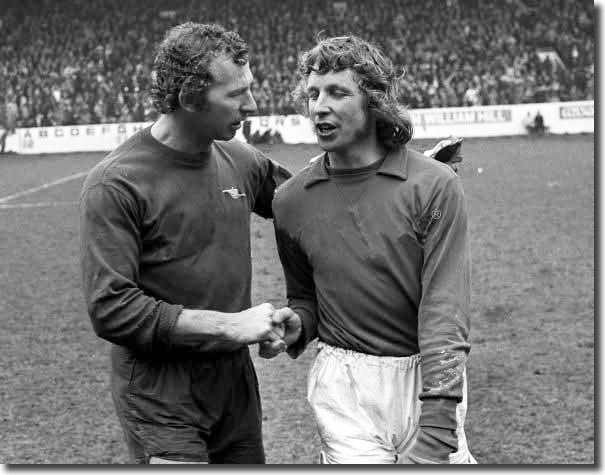 1972/73 had been in many ways a re-run of the
nightmares of 1970 for Leeds United; within the space of a fortnight,
their pursuit of the league title ran into the sand and they suffered
the ignominy of losing the FA Cup final to Second
Division Sunderland in one of the biggest Cup upsets of all time.
1972/73 had been in many ways a re-run of the
nightmares of 1970 for Leeds United; within the space of a fortnight,
their pursuit of the league title ran into the sand and they suffered
the ignominy of losing the FA Cup final to Second
Division Sunderland in one of the biggest Cup upsets of all time.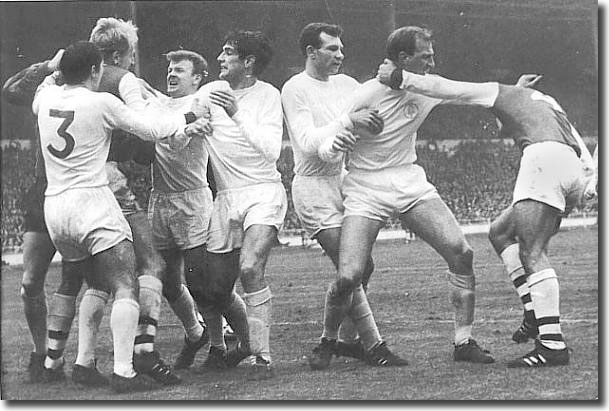 proceedings.
proceedings.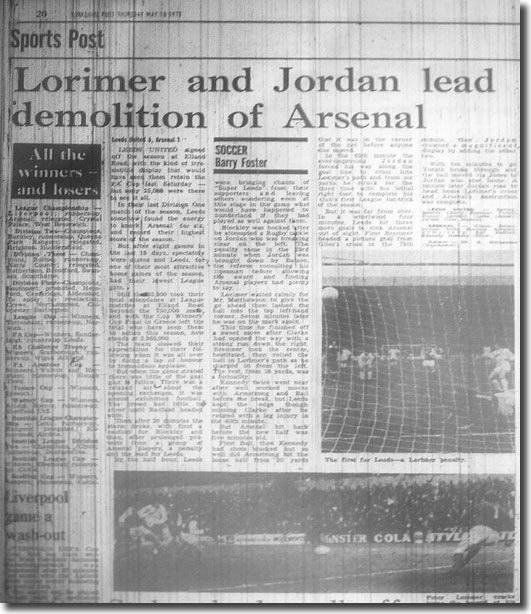 outfit
had started the game well and seemed to have got the Wembley experience
out of their systems.
outfit
had started the game well and seemed to have got the Wembley experience
out of their systems.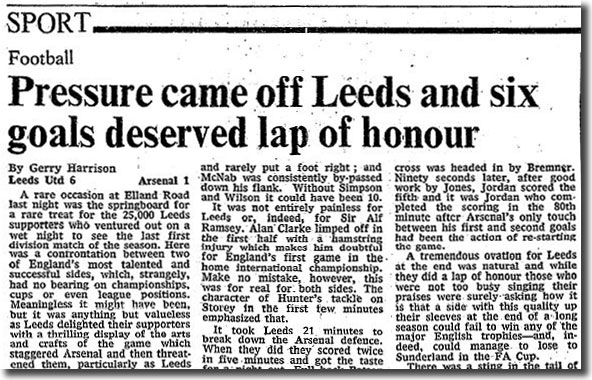 United's sixth goal of
the night, rising magnificently to nod home a cross from Lorimer. Arsenal's
only touches of the ball between Jordan's brace came when they restarted
the game. They simply had no answer to such incisive attacking play.
United's sixth goal of
the night, rising magnificently to nod home a cross from Lorimer. Arsenal's
only touches of the ball between Jordan's brace came when they restarted
the game. They simply had no answer to such incisive attacking play.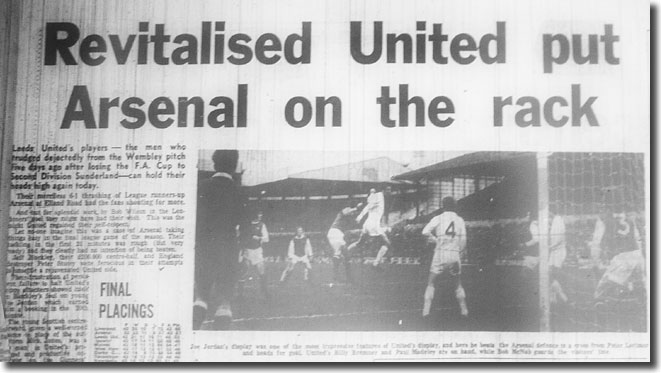 end.
end.